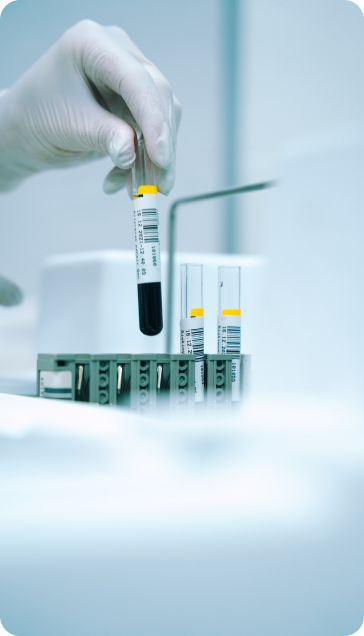List of Included Tests - 67 Tests
This test helps to screen and diagnose Hepatitis B virus infection. It also helps to detect previous Hepatitis B infection which had been resolved. It is also done to monitor the ongoing treatment of hepatitis.
HCV antibody test, is used to find out if someone has ever been infected with the hepatitis C virus. The HCV antibody test, sometimes called the anti-HCV test, looks for antibodies to the hepatitis C virus in blood.
Antibody tests can take 23 to 90 days to detect HIV infection after an exposure. Most rapid tests and self-tests are antibody tests. In general, antibody tests that use blood from a vein can detect HIV sooner after infection than tests done with blood from a finger prick or with oral fluid.
Iron tests measure different substances in the blood to check iron levels in your body. Iron is
a mineral essential for making red blood cells. Red blood cells carry oxygen from your lungs to the rest of your body. Iron is also important for healthy muscles, bone marrow, and organ function. Iron levels that are too low or too high can cause serious health problems.
Ferritin is a blood protein that contains iron. A ferritin test helps your doctor understand how much iron your body stores. Ferritin test reveals that your blood ferritin level is lower than normal, it indicates that your body iron stores are low and you have iron deficiency. As a result, you could be anemic.
Zinc can be tested along with other trace elements (e.g iron, copper & selenium) to identify deficiencies where a person may benefit from supplementation. When a person displays clinical symptoms that may be associated with zinc deficiency, the measurement of zinc can determine if supplementation is required.
Vitamin A is present in many foods. It is important for normal vision, the immune system, reproduction, growth and development. Vitamin A also helps your heart, lungs, and other organs work properly.
A prolactin (PRL) test measures the level of prolactin in the blood. Prolactin is a hormone made by the pituitary gland, a small gland at the base of the brain. Prolactin causes the breasts to grow and make milk during pregnancy and after birth. Prolactin levels are normally high for pregnant women and new mothers.
Vitamin C is a water-soluble vitamin, antioxidant, and essential co-factor for collagen biosynthesis, carnitine and catecholamine metabolism, and dietary iron absorption.a deficiency in vitamin C results in scurvy, which presents with hemorrhage,.
Vitamin E is an importan nutrient to vision, reproduction, and the health of your blood, brain and skin. Vitamin E also has antioxidant properties. Its defeciency can lead to nerve and muscle weakness.
Vitamin D is essential for several reasons, including maintaining healthy bones and teeth.It may also protect against a range of diseases and conditions, such as type 1 diabetes.
Vitamin B-12 plays an essential role in red blood cell formation, cell metabolism, nerve function and the production of DNA ( molecules inside cells that carry genetic information. Vitamin B-12 deficiency can lead to anemia, fatigue, muscle weakness, intestinal problems, nerve damage and mood disturbances.
AMH analysis is usually performed when there is a need to evaluate ovarian functions and evaluate fertility problems in women. AMH levels can provide information about fertility, the ability to get pregnant. The test may also be used to help diagnose menstrual disorders or to monitor the health of women.
A CA 125 test measures the amount of the protein CA 125 (cancer antigen 125) in the blood. This test may be used to monitor certain cancers during and after treatment. In some situations, the test may be used to look for early signs of ovarian cancer in people with a very high risk of the disease. A CA 125 test isn’t accurate enough to use for ovarian cancer screening in general because many conditions can increase the level of this protein. Conditions that can cause an increase in CA 125 include many that aren’t cancerous, such as menstruation and uterine fibroids. Certain cancers may also cause an increased level of CA 125, including ovarian, endometrial, peritoneal and fallopian tube cancers.
Cancer antigen 15-3 (CA 15-3) is a protein produced by cells in response to changes occurring in the body. CA 15-3 is considered a tumor marker because high levels of the antigen may indicate certain cancers, including breast cancer. CA 15-3 tests aren’t used to diagnose cancer, but rather to assess how cancer is responding to treatment. CA 15-3 fluctuations help cancer doctors determine whether a tumor is stable, growing, shrinking or has recurred.
A carcinoembryonic antigen (CEA) test is a blood test used to help diagnose and manage certain types of cancers. The CEA test is used especially for cancers of the large intestine and rectum. Your doctor can also use the test results to help determine if a cancer treatment is working
A protein that is secreted during the presence of a bacterial infection in the gastrointestinal tract and is checked through a stool sample. It helps determine if you have an inflammatory or noninflammatory bowel condition.
The fecal immunochemical test (FIT) is a screening test for colon cancer. It tests for hidden blood in the stool, which can be an early sign of cancer. FIT only detects human blood from the lower intestines. Medicines and food do not interfere with the test.
The high-sensitivity C-reactive protein (hs-CRP) test is a blood test that measures (CRP) even in low levels. This protein measures general levels of inflammation in your body. The hs-CRP can be used to find the risk for heart disease and stroke in people who don’t already have heart disease.
Blood pressure is the force of blood on the walls of blood vessels, through which it travels to supply all the tissues and organs of the body with food, oxygen, water and enzymes in what is known as the circulatory system.
A calcium blood test measures the amount of calcium in your blood. Calcium is one of the most important minerals in your body. You need calcium for healthy bones and teeth. Calcium is also essential for proper functioning of your nerves, muscles, and heart.
The serum phosphate test measures the amount of inorganic phosphate in your blood plasma (the liquid part of blood). In the body, phosphorus is combined with oxygen to form a variety of phosphates (PO4). Phosphates are vital for energy production, muscle and nerve function, and bone growth.
It’s a test measures the amount of Alkaline phosphatase (ALP) in the blood. ALP is an enzyme found in your body, its presence in high levels indicates that your liver isn’t working right . ALP is also secreted from bone, kidneys, liver, GIT, ..etc. And it is commonly used to diagnose liver, bile ducts damage or bone disorders
This test measures the level of parathyroid hormone (PTH) in the blood. PTH, also known as parathormone, is made by your parathyroid glands. These are four pea-sized glands in your neck. PTH controls the level of calcium in the blood.
A complete blood count (CBC) is a blood test used to evaluate your overall health and detect a wide range of disorders, including anemia, infection, platelets disorders and leukemia.
BMI is a person’s weight in kilograms (or pounds) divided by the square of height in
meters (or feet). A high BMI can indicate high body fatness. BMI screens for weight categories that may lead to health problems, but it does not diagnose the body fatness or health of an individual.





